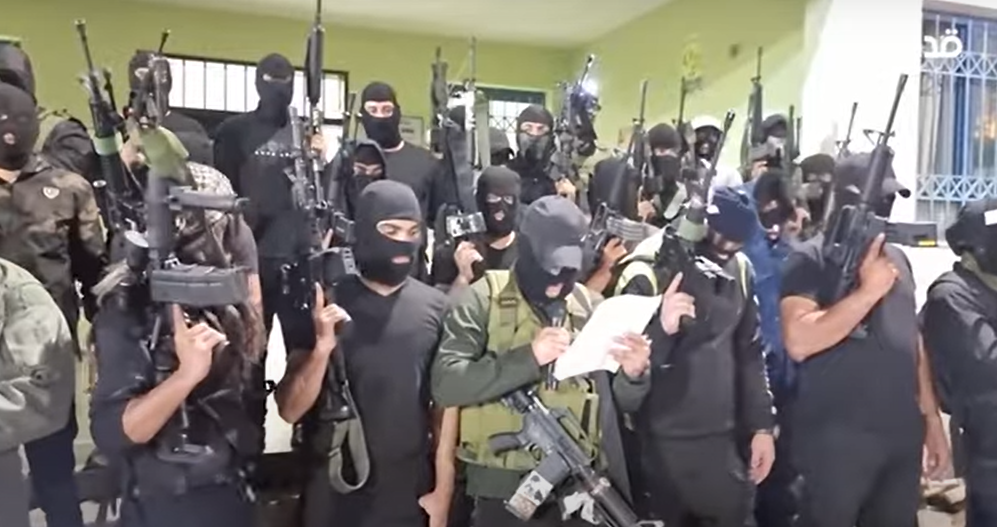There is a war raging in Judea and Samaria
Recent months have been particularly challenging due to various reasons. The primary cause is a sharp decline in the Palestinian Authority's ability to govern. This, in turn, prompts various actors, some terrorists and some criminals, to take action, compelling Israel to intensify its activities in the region.
Yoav Limor
Israel Hayom
Oct 6, 2023
Palestinian gunmen in the Jenin refugee camp
In the heart of Judea and Samaria (the West Bank), a daily war rages on, marked by events and violence with no ending in site. Even the peak has not reached.
Despite its intensity, this escalation has barely registered on the radar of Israelis by and large. The reason for this lies in the phenomenal success of Israel's intelligence and operational efforts through the Shin Bet security agency and the Israel Defense Forces (IDF), which allow Israel to maintain a semblance of upper hand.
In reality, the public only becomes aware of this war when there are casualties, as seen in this week's operation in Talkarm. Numerous similar operations conducted in recent days received little acknowledgment despite tangible results such as arrests or the disruption of terrorist plots.
This war in the West Bank has been ongoing for several months, with its intensity fluctuating. Some argue it has been just part of the ongoing conflict that we have seen since the state was founded 75 years ago or even earlier. However, recent months have been particularly challenging due to various reasons. The primary cause is a sharp decline in the Palestinian Authority's ability to govern. This, in turn, prompts various actors, some terrorists, and some criminals, to take action, compelling Israel to intensify its activities in the region. The outcome is increased Israeli operations, heightened Palestinian violence, and more casualties, necessitating further Israeli engagement.
Another factor is the deepening Iranian involvement in the region. In the past, Iran's activities were primarily focused on the northern front and to a lesser extent on Gaza. Its meddling in the West Bank, if any, was channeled through its proxies in the area. Today, Iran's influence is significantly greater, with some of it being exerted directly, including financial aid, weapons, and Iranian directives that reach operatives on the ground. Simultaneously, Iran demands a return for its investment in Hamas and the Palestinian Islamic Jihad – and they have been heeding that request through their activities in the West Bank.
The third reason is internal Israeli dynamics. Terror groups perceive weakness on the Israeli side and view the current point in time – with domestic strife tearing Israeli society apart – as an opportune time to strike. Other players that have previously been on the fringes view the current government's extremism as a sign that there's no one to negotiate with and have concluded that they should join the fray. Even if they are just using this situation as a pretext to engage in violence, the bottom line is clear: more terror, more violence, less stability, and less security in the region.
Israel's response to all these challenges comprises a mix of sticks and carrots: Propping up the Palestinian Authority and engaging in dialogue with its various powers that be, while at the same time combating terrorism on the other. This policy has been in place for years; those advocating for a comprehensive change through a wide-scale military operation don't offer a concrete solution to the fundamental question: What to do with three million Palestinians in the West Bank (and two million in Gaza) after another extensive military campaign?
The possibility of such an operation is always looming. In the meantime, the Shin Bet and the IDF manage to provide high-quality intelligence that prevents nearly 95% of terror attacks. But alongside the success in countering major plots, the challenge posed by softer, more local terrorism – characterized by stone-throwing and Molotov cocktails – is growing. There has been a dramatic increase in the latter form of attacks recently, necessitating the deployment of larger forces by the IDF in an attempt to deter or at least separate militants from civilians.
This effort has yet to succeed in calming the region. On the contrary, every week appears more volatile than the last, with each incident holding the potential to ignite a large-scale conflagration, including in Gaza. The possibility of an agreement with Saudi Arabia could accelerate this process if Palestinians feel increasingly isolated. Since Israel is likely to remain alone with this problem, it must seek solutions before descending into widespread and devastating violence.

No comments:
Post a Comment